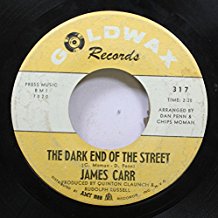
The Dark End of the Street
"The Dark End of the Street" is a 1967 soul song, written by songwriters Dan Penn and Chips Moman and first recorded by James Carr. It became his trademark song, reaching number 10 on Billboard Magazine's R&B Chart, and crossing over to number 77 on the Billboard Hot 100.
"Dark End of the Street" redirects here. For other uses, see The Dark End of the Street (disambiguation)."The Dark End of the Street"
1967
- Quinton Claunch
- Rudolph Russell
Influences[edit]
Van Morrison's song "Bright Side of the Road" includes the lyrics "From the dark end of the street, to the bright side of the road," which some people believe was influenced by Penn and Moman's song.[9]
Cover versions[edit]
Many artists have recorded versions of the song, but none charted as highly as Carr's version.[10] In 1970, Aretha Franklin released a version on her album This Girl's in Love with You;[11] this interpretation was praised by musicologist Craig Werner as adding "something absolutely original", with Franklin implying a further final step in the song's story, a determination of the illicit couple to stand together.[12]
In 1974, the song was famously covered by Linda Ronstadt in her breakthrough album, the Grammy-nominated Heart Like a Wheel. It was an album of many covers of lesser-known songs and minor hits of other artists given a fresh take by Ronstadt and producer Peter Asher and made them all her own.
Notable appearances in other media[edit]
The entire song was covered in a pivotal scene from the 1991 film The Commitments, as well as featuring prominently in the teaser trailer for Marvel's Wolverine, a video game by developer Insomniac Games.